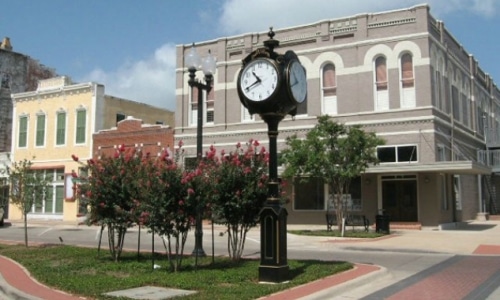Find out whether you’re better suited to an urban or rural college environment.

During your search for the perfect college match, you may be torn between big-city destinations and a small-town atmosphere. Both of these options come with their own benefits and drawbacks. In the end, your personal preferences and desired college experience will help you determine which is the better fit for you.
Thinking about what you hope to get out of your college experience will help you decide which school is right for you.
Big City Colleges: Pros and Cons
Is a bustling urban campus the right setting for your college years? Large cities have a lot to offer students in the way of opportunities, but they can also detract from the typical college experience. Check out the benefits and drawbacks to attending college in a big city.
Pros
- Career resources: According to The College Board, students in a big city typically have access to more internships, cooperative classes and other career-boosting experiences. Imagine having an internship at a top company in your field on your resume before you even graduate.
- Public transportation: Most students can get where they need to be by train or bus in a big city. You may not need to have a car, and an airport is nearby if you want to travel home for breaks and holidays.
- Cultural diversity: Big cities tend to attract diversity both in their college students and their general population.
- Cultural opportunities: With museums, concerts, theater performances and other cultural events happening all the time, there’s no shortage of things to do off campus.
Cons
- Looser student community: Students may live all over the city rather than being centered on and around the campus. In addition, there is so much to do in a city that students may not spend much of their free time on campus. As a result, the feeling of community at an urban college may not be as strong.
- Cost of living: The cost of living is typically higher in a big city, says CU Student Loans. Make sure you can afford it before you move there.
- Less traditional feel: Urban campuses sometimes lack football games, Greek life, a large open quad and other classic college signifiers. If you crave the traditional college experience, a big city campus might not be for you.
- Distractions: A big city can bring many more distractions than a small town. Most cities are louder and have higher crime rates. Plus, there are more opportunities to go out and do fun things in the city, which can take focus away from your studies.

Small Town Colleges: Pros and Cons
Are you more comfortable in a small-town atmosphere? Even if you are, there are plenty of pros and cons to take into account when you’re considering a small town or rural setting for your college years.
Pros
- Tighter community: Campuses in small towns tend to be fairly self-contained and most students live on or very close to campus. Plus, students are often found doing things on campus in their free time, whether it’s a school-sponsored event or just hanging out. This can lead to a close feeling of community among the student body.
- Traditional college experience: According to PeerTransfer, a small-town college is more likely to have the things we most associate with the classic college experience: football games, Greek life and a beautiful campus setting.
- Fewer distractions: Small towns provide few distractions, making it easy to focus on academics.
- Cheap: Most small towns have a lower cost of living for everything from food to entertainment to rent.
- Outdoor experiences: According to CU Student Loans, “Rural colleges are more likely to have ready access to woods, hiking, bodies of water and more.” This can be great for outdoorsy types or those who hope to major in subjects like agriculture or environmental science.
Cons
- Quieter social life: While there are often things to do on campus, there may not be much to do in the surrounding area. A small-town college will generally have a quieter feel than a big-city college.
- Tougher transportation: Doing anything beyond campus may require having your own vehicle. Whether you need to go to the grocery store or head home over a holiday break, you will likely need to have a car or hitch a ride with a friend.
- Fewer resources: While a rural setting is great for a few majors, many other students may not be able to find a relevant internship in their surrounding community. The few internships available may be intensely competitive due to limited availability.
Best of Both Worlds
If you’ve read through all these benefits and drawbacks and still can’t seem to choose which is best for you, keep in mind that there are always exceptions to the rule. A number of colleges provide the “best of both worlds,” so to speak. Here are a few examples:
- Georgetown University: Located in Washington, DC, this university offers all the perks of big-city life. However, the actual neighborhood surrounding the college has a quieter feel than you might expect of an urban campus.
- Northwestern University: Located in Evanston, Illinois, this suburban campus has a small-city feel with lots of great local shops and entertainment options. However, it’s just a 30-minute train ride from Chicago, making car-free transportation a breeze and opening students up to great internship and career resources.
- Villanova University: Located just outside Philadelphia, Villanova has many of the attractions of a classic college experience – including a stunning campus and active sports teams – while still being adjacent to a major city.

Finding the right college can be a challenge. Start by thinking about what you hope to get out of your college experience, and make as many campus visits as you can to get a better sense of what each of your options would be like.